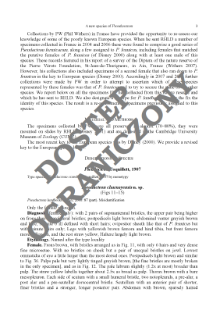
Object
Title: Obtusoecia (Halocyprida: Myodocopa: Ostracoda) a bipolar planktonic oceanic genus : Taxonomy, bathymetry and zoogeographical distribution
Subtitle:
Annales Zoologici, vol. 56, no 1 ; Planktonic ostracod genus Obtusoecia
Contributor:
Muzeum i Instytut Zoologii Polskiej Akademii Nauk
Publisher:
Place of publishing:
Description:
Bibliogr. s. 208-210 ; S. 197-213 : il. ; 27 cm ; Nazwy taksonów w jęz. łac.
Type of object:
Abstract:
Full detailed descriptions of the two species of Obtusoecia, one of two planktonic halocyprid ostracod genera that are bipolar, demonstrate that the taxonomic separation of these two forms formerly considered to be conspecific, is valid. The segregation of the genus from Porroecia is also validated. The value of characters of limbs other than the first and second antennae particularly in defining halocyprid genera is emphasised. Zoogeographical distributions of the two species based on comprehensive compilations of both published and unpublished data show that O. obtusata is confined to the North Atlantic, whereas O. antarctica has an Antarctic circumpolar distribution. Detailed bathymetric profiles show that O. obtusata is a shallow mesopelagic species that is overwhelmingly dominant at depths of 50–200 m in subpolar seas, and shows limited ability to submerge at lower depths, so thatit is restricted to seas that have a marked seasonal cycle of turn-over and stratification. It is postulated that the bathymetric distributions of the two species are similar, also that O. antarcticais more likely to be ancestral to O. obtusata than vice versa.
Relation:
Volume:
Issue:
Start page:
End page:
Detailed Resource Type:
Format:
Resource Identifier:
Source:
MiIZ PAN, patrz sygn. czas. P.255, vol 56, no 1 ; MiIZ PAN, patrz sygn. czas. P.4314, vol 56, no 1 ; click here to follow the link
Language:
Language of abstract:
Rights:
Prawa zastrzeżone - dostęp ograniczony
Terms of use:
Digitizing institution:
Muzeum i Instytut Zoologii Polskiej Akademii Nauk
Original in:
Biblioteka Muzeum i Instytutu Zoologii PAN
Projects co-financed by:
Unia Europejska. Europejski Fundusz Rozwoju Regionalnego ; Program Operacyjny Innowacyjna Gospodarka, lata 2010-2014, Priorytet 2. Infrastruktura strefy B + R
Access:
Object collections:
- Digital Repository of Scientific Institutes > Partners' collections > Museum and Institute of Zoology PAS > Scientific Journals
- Digital Repository of Scientific Institutes > Partners' collections > Museum and Institute of Zoology PAS > MIZ PAN Publications > Annales Zoologici
- Digital Repository of Scientific Institutes > Literature > Journals/Articles
Last modified:
Oct 2, 2020
In our library since:
Feb 3, 2015
Number of object content downloads / hits:
112
All available object's versions:
https://rcin.org.pl/publication/54780
Show description in RDF format:
Show description in RDFa format:
Show description in OAI-PMH format:
Objects Similar
Radčenko, Aleksandr Grigor'evič Czechowski, Wojciech Czechowska, Wiesława
Radchenko, Alexander G.
Radčenko, Aleksandr Grigor'evič
Kaprus', Ighor J. Pomorski, Romuald Jacek
Johnson, Paul J.
Radčenko, Aleksandr Grigor'evič Czechowski, Wojciech Czechowska, Wiesława
Urhan, Raşit
Radčenko, Aleksandr Grigor'evič

 INSTYTUT ARCHEOLOGII I ETNOLOGII POLSKIEJ AKADEMII NAUK
INSTYTUT ARCHEOLOGII I ETNOLOGII POLSKIEJ AKADEMII NAUK
 INSTYTUT BADAŃ LITERACKICH POLSKIEJ AKADEMII NAUK
INSTYTUT BADAŃ LITERACKICH POLSKIEJ AKADEMII NAUK
 INSTYTUT BADAWCZY LEŚNICTWA
INSTYTUT BADAWCZY LEŚNICTWA
 INSTYTUT BIOLOGII DOŚWIADCZALNEJ IM. MARCELEGO NENCKIEGO POLSKIEJ AKADEMII NAUK
INSTYTUT BIOLOGII DOŚWIADCZALNEJ IM. MARCELEGO NENCKIEGO POLSKIEJ AKADEMII NAUK
 INSTYTUT BIOLOGII SSAKÓW POLSKIEJ AKADEMII NAUK
INSTYTUT BIOLOGII SSAKÓW POLSKIEJ AKADEMII NAUK
 INSTYTUT CHEMII FIZYCZNEJ PAN
INSTYTUT CHEMII FIZYCZNEJ PAN
 INSTYTUT CHEMII ORGANICZNEJ PAN
INSTYTUT CHEMII ORGANICZNEJ PAN
 INSTYTUT FILOZOFII I SOCJOLOGII PAN
INSTYTUT FILOZOFII I SOCJOLOGII PAN
 INSTYTUT GEOGRAFII I PRZESTRZENNEGO ZAGOSPODAROWANIA PAN
INSTYTUT GEOGRAFII I PRZESTRZENNEGO ZAGOSPODAROWANIA PAN
 INSTYTUT HISTORII im. TADEUSZA MANTEUFFLA POLSKIEJ AKADEMII NAUK
INSTYTUT HISTORII im. TADEUSZA MANTEUFFLA POLSKIEJ AKADEMII NAUK
 INSTYTUT JĘZYKA POLSKIEGO POLSKIEJ AKADEMII NAUK
INSTYTUT JĘZYKA POLSKIEGO POLSKIEJ AKADEMII NAUK
 INSTYTUT MATEMATYCZNY PAN
INSTYTUT MATEMATYCZNY PAN
 INSTYTUT MEDYCYNY DOŚWIADCZALNEJ I KLINICZNEJ IM.MIROSŁAWA MOSSAKOWSKIEGO POLSKIEJ AKADEMII NAUK
INSTYTUT MEDYCYNY DOŚWIADCZALNEJ I KLINICZNEJ IM.MIROSŁAWA MOSSAKOWSKIEGO POLSKIEJ AKADEMII NAUK
 INSTYTUT PODSTAWOWYCH PROBLEMÓW TECHNIKI PAN
INSTYTUT PODSTAWOWYCH PROBLEMÓW TECHNIKI PAN
 INSTYTUT SLAWISTYKI PAN
INSTYTUT SLAWISTYKI PAN
 SIEĆ BADAWCZA ŁUKASIEWICZ - INSTYTUT TECHNOLOGII MATERIAŁÓW ELEKTRONICZNYCH
SIEĆ BADAWCZA ŁUKASIEWICZ - INSTYTUT TECHNOLOGII MATERIAŁÓW ELEKTRONICZNYCH
 MUZEUM I INSTYTUT ZOOLOGII POLSKIEJ AKADEMII NAUK
MUZEUM I INSTYTUT ZOOLOGII POLSKIEJ AKADEMII NAUK
 INSTYTUT BADAŃ SYSTEMOWYCH PAN
INSTYTUT BADAŃ SYSTEMOWYCH PAN
 INSTYTUT BOTANIKI IM. WŁADYSŁAWA SZAFERA POLSKIEJ AKADEMII NAUK
INSTYTUT BOTANIKI IM. WŁADYSŁAWA SZAFERA POLSKIEJ AKADEMII NAUK


































